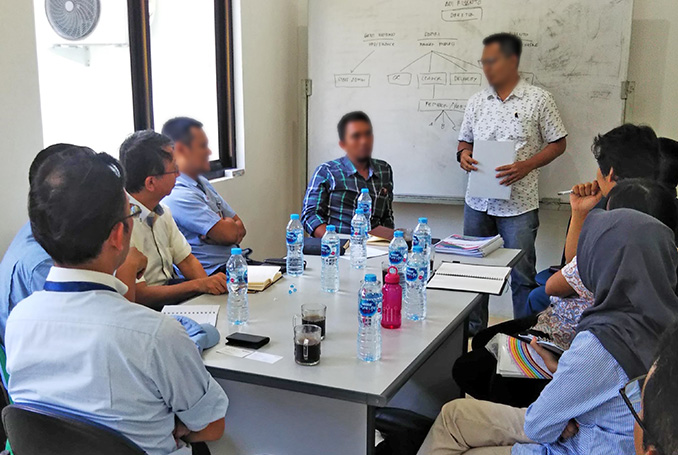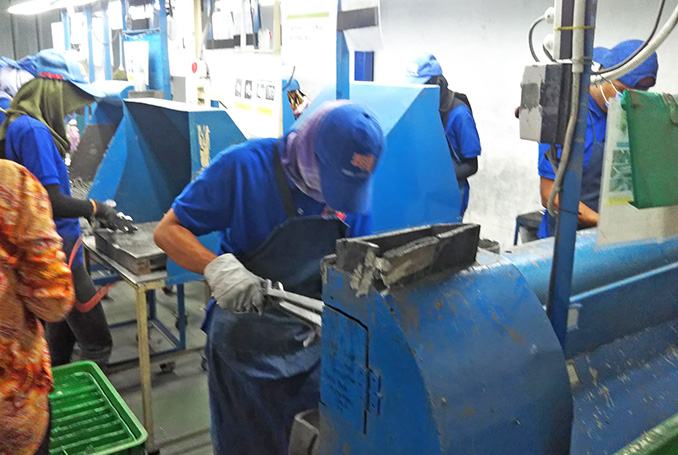Human Rights
Thoughts on Human Rights

As described in Basic Policies of Sustainability, the Yamaha Motor Group strives to contribute to the sustainable development of society through our business activities based on our corporate philosophy and to always abide by the letter and spirit of domestic and international laws and regulations. We are dedicated to earning the trust of the global community, and we place great value on communicating with all stakeholders. We recognize that respect for human rights is an issue of vital importance.
In 2017, the Yamaha Motor Group signed on to the UN Global Compact advocated by the United Nations. As a corporate group, we have and will continue to support the Universal Declaration of Human Rights, the International Labour Organization’s Declaration on Fundamental Principles and Rights at Work, the Guiding Principles on Business and Human Rights, and the Children’s Rights and Business Principles, which support the principles related to human rights and labor in the UN Global Compact.
The Yamaha Motor Group strives to ensure legal compliance in every country and community where the Group companies pursue business activities. But no matter what laws and regulations might prevail, business is conducted with priority given to international agreements and the spirit of the UN Global Compact. In addition, the scope of respect for human rights goes beyond employees of the Yamaha Motor Group to include suppliers and other business partners.
Policies and Guidelines

Yamaha Motor Group Sustainability Basic Policy
We have made the declaration that “We will respect human rights, will not discriminate, and will not use child labor or carry out forced labor under any form” toward all stakeholders, including employees and business partners.
Yamaha Motor Group Human Rights Policy
Based on the Yamaha Motor Group Sustainability Basic Policy, we have established the Human Rights Policy that serves as the foundation for all Yamaha Motor Group business activities.
Code of Ethics
The Code of Ethics prohibits all forms of harassment against employees including sexual harassment and power harassment, child labor and forced labor, and slander against employees concerning matters pertaining to their fundamental human rights such as their race, nationality, ideology, religion, gender, philosophy of life, bodies, sexual orientation, personality, relatives, age or health conditions, and encourages efforts to create environments where people respect diversity and acknowledge each other and where they can vibrantly display their abilities.
Sustainability Guideline for Suppliers
We ask that our suppliers strive in all aspects of employment to eliminate discrimination on the basis of race, ethnicity, nationality, religion, sex and other issues, to refrain from the use of child labor or forced labor, to ensure fair working hours and wages, and to engage employees in dialogue and communication in good faith.
Statement on Modern Slavery Act
In accordance with the Modern Slavery Act, we publish a statement on our website in the United Kingdom and Australia and update it yearly.
Thorough, Company-wide Implementation of Human Rights Policy

In regard to human resources development, in our stratified training, we take up sustainability as a topic and include explanations related to human rights. Additionally, human rights-related training is provided by establishing it as a theme for inclusion in compliance training and in e-learning.
We obtain written resolutions from the Boards of Directors from all group companies stating compliance with the Yamaha Motor Group Human Rights Policy, and for major group companies, we give explanations to management and the departments in charge and provide materials for employee education.
We send our business partners a statement requesting compliance with our Human Rights Policy, signed by the company president, we obtain a commitment form from our suppliers stating their compliance with our Sustainability Guideline for Suppliers, and we ask dealers to incorporate compliance with our Human Rights Policy when they renew their contracts with us.
Human Rights Due Diligence

Group companies including headquarters
When starting a new business, we implement due diligence concerning the risks in the environment, society, human rights, and labor related business and regionality.
The Risk Management System that covers all business divisions and subsidiaries of the group incorporates human rights related risks, including those in the supply chain, and such risks are considered as targets for monitoring, evaluation and the preparation of countermeasures. These risks are assumed to be the following: “discrimination, acts or speech violating human rights, or harassment between employees and executives (full-time and non full-time) or between employees or executives and business partners or potential hires. The Group may suffer the loss of reputation, lawsuits, boycotts or financial loss as a result of these.”
In 2023, this risk assessment identified 94 Group companies (21 in Japan, 73 overseas) with human rights-related risks, and they carried out investigations, training and monitoring at each location, partly in response to the selection of human rights as Group Major Risks and the direction to all subsidiaries to take countermeasures.
The Human Resources Division of corporate headquarters checks with each subsidiary company each year to confirm that no forced labor, child labor, harassment, discriminatory actions on the basis of race, gender (female, etc.), religion, or country of origin, or other violations are occurring. We also conduct a Groupwide compliance awareness survey each year to gauge how aware employees are about human rights.
Additionally, in 2023 we expanded the scope of coverage so that human rights risk surveys are also conducted at other non-subsidiary business investment companies.
Business Partners
In 2019, we had a third party assess the labor environment including issues of human rights abuses at three suppliers in our major market of Indonesia, and in 2021 and 2022 we worked with a third-party organization specializing in human rights to perform assessments and follow-ups at four companies, focusing on foreign technical interns who are the subject of much attention in Japan where our corporate headquarters is located.


In 2023, we used the formulation of the Yamaha Motor Group Human Rights Policy as an opportunity to increase comprehensiveness, and we are conducting due diligence from a more objective viewpoint with the cooperation of third parties.
To be more specific, based on 15 national, regional and job-type risk indicators related to forced labor, labor rights, gender discrimination, etc. announced by the Walk Free Foundation (WFF), International Trade Union Confederation (ITUC), World Economic Forum (WEF) and other public organizations, we examined locations in seven countries with a high human rights risk, judged that 63 of the suppliers there were high risk, and distributed and collected self-diagnosis questionnaires. The questionnaire results are currently being tallied, and we intend to conduct on-the-ground site visits in 2024 after receiving the results.
Correction and Relief
For internal stakeholders, we have established and are operating internal reporting systems (Whistle-Blowing Systems) through the Compliance Hotline to enable prompt reporting of compliance-related matters, including human rights matters.
In 2023, we received eight reports (including those received from sources other than the hotline) of matters related to human rights violations throughout the Yamaha Motor Group. In response to the cases that occurred, in addition to strictly dealing with them according to the disciplinary regulations of each company, the Human Resources Division provided the workplaces where the incidents occurred with guidance and education aimed at prevention and countermeasures. The Code of Ethics has also been revised (to include respect for human rights and prohibitions on harassment) and shared, and we continue to select “Violation of Human Rights and Harassment” as Group Major Risks.
For external stakeholders, the following Human Rights Hotline is available for reporting of human rights related matters.
Human Rights Hotline for External Stakeholders
Reports to the Human Rights Hotline from our external stakeholders are accepted via the web form on this website.
ELIGIBLE MATTERS
Human Rights Hotline accepts matters in which the business activities of Yamaha Motor Group or those of our business partners associated with our group's business activities have caused systematic and substantive negative impacts (harms) on human rights in violation of international principles or national laws on human rights (e.g., forced labor, child labor, significant lack of occupational health and safety, negative impacts on local residents due to environmental pollution), or matters in which there is concern that systematic and substantive negative impacts (harms) on human rights may occur.
Human Rights Hotline does not accept matters that are not related to human rights stipulated in international principles or national laws on human rights, such as individual complaints about human relations or discretionary acts of personnel management in the workplace, or complaints regarding the quality of the Yamaha Motor Group's products or services.
ELIGIBLE USERS
The eligible users are those who have suffered negative impacts (harms) on their human rights, and those who belong to the same organization, entities, etc. as the person who has suffered negative impacts (harms) on their human rights.
PLEASE READ CAREFULLY BEFORE REPORTING
- Response to the matters reported anonymously may be limited.
- We respond to reports that meet the Eligible Matters, the Eligible Users, and other instructions in the report form. Nevertheless, the reports meeting said criteria may not be responded, depending on the nature of the matters.
- Contents of the report and the submitted materials will be used by Yamaha Motor Group or our external agents, service providers, or business partners to the extent necessary for responding to the matters, including investigation and taking corrective and remedial measures.
- We may disclose or publish a summary of the operation of this Human Rights Hotline.
- Human Rights Hotline is not available for Yamaha Motor Group employees and other internal stakeholders.
- You may report either in Japanese or English.
※The above is a standard handling flow, and the actual flow may vary depending on the case.